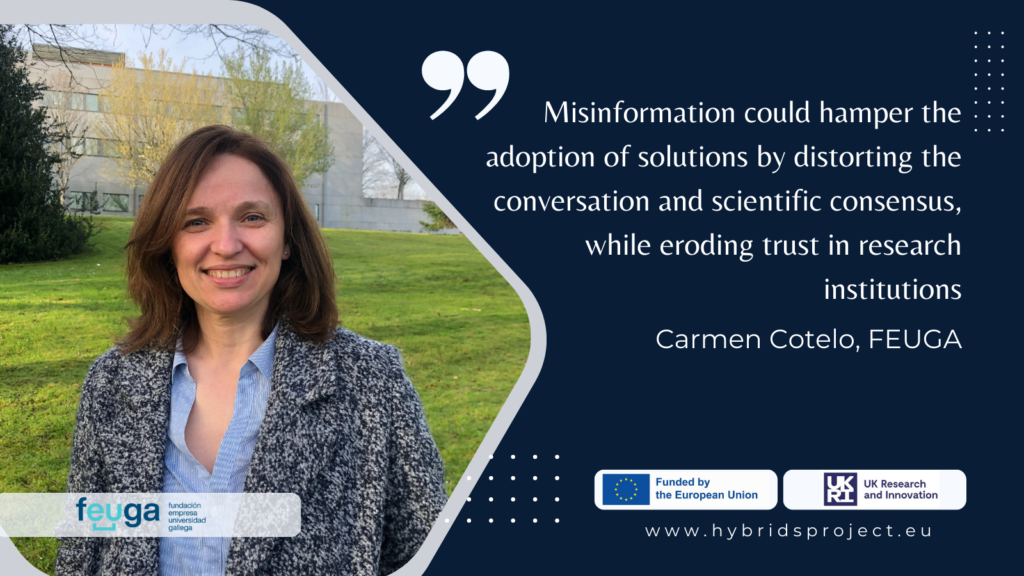By Maria Campins, Newtral
Carmen Cotelo is the Deputy Director of Innovation and EU Programmes at Fundación Empresa Universidad Gallega (FEUGA) in Spain. She has a degree in Physics and a Ph.D. in Computer Science and is also a member of the HYBRIDS project, an acronym for Hybrid Intelligence to monitor, promote and analyse transformations in good democracy practices.
Throughout the HYBRIDS initiative, different deep learning techniques will be developed on the basis of an exhaustive analysis of public discourse about crucial global issues, such as health, climate crisis, European scepticism or immigration, which will take into account both traditional media and content published through social networks.
Why is it important to increase knowledge and investigation in hybrid intelligence?
We have to think about how we interact with the rest of the world on a daily basis. When you go to a search engine, you are instantly presented with more information that you could ever process. Meanwhile, you are permanently available at social media, places in which there is a fight for your attention span and in terms of response time.
Enter the AI. You then have in front of you an environment where fake news and disinformation can only be expected to proliferate, fueled by the sheer volume of data and the way we share it. However, AI-based tools can also help us distinguish truthful news, but only if we increase knowledge and research in key areas like hybrid intelligence.
How is hybrid intelligence important to fight misinformation?
AI can handle large amounts of data and identify relevant patterns, yet there is key information hidden in the characteristics and symbolism of the human language and knowledge; you cannot rule out context, ethics, or values.
To take those aspects into account, you need to leverage both AI algorithms and human intelligence to improve the accuracy, allowing society in general, and communication professionals in particular, to access reliable information and make informed decisions.
How can hybrid intelligence systems overcome the shortcomings of existing artificial intelligence methods?
The same way AI complements human abilities, we can supplement tools and algorithms by applying expert knowledge from different areas -linguists, political scientists, communication experts, et cetera- to consider valuable information embedded in the human language. In other words, combining human expertise with AI can help create more adaptable and effective systems.
What are some of the challenges you face in your work?
As experts in knowledge transfer, our work is linked to communicating and disseminating scientific knowledge to society. This has great social importance, requiring a high degree of responsibility. We rely on websites, social media, and other online platforms to transfer and valorise Research, Development and Innovation results. Fake news and misinformation might hamper the adoption of relevant solutions, as they distort the conversation and scientific consensus, while eroding trust in research institutions.
Hybrid Intelligence can be the answer to this threat. Together with the active promotion of scientific literacy, critical thinking and other transversal skills, these elements will help us reduce the spread of false and misleading information.
What do you aim to achieve with HYBRIDS?
FEUGA’s main aim in HYBRIDS is to contribute to the advancement in the research on hybrid intelligence systems, by fostering relevant transversal competences for current and future researchers in this field. Our experience in innovation and knowledge transfer means that we will be supporting an interdisciplinary network of stakeholders. Participating in HYBRIDS will allow FEUGA to acquire valuable knowledge, which in turn will have an impact in other knowledge transfer initiatives, especially those that require the use of communication channels, from social to mass media.

